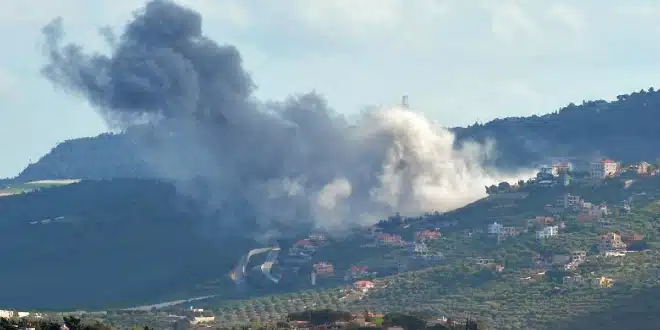At least four people were killed and 17 others injured in Israeli airstrikes across southern Lebanon on Wednesday, according to Lebanon’s health ministry and state media. The casualties included several children, highlighting once again the human cost of a conflict that has persisted despite a ceasefire agreement reached less than a year ago.
Multiple Strikes Across the South
The day of violence began with an Israeli drone attack in the town of Yater, where Hezbollah member Al-Munim Moussa Sweidan was killed, the Israeli military confirmed. Later, Israeli forces launched additional strikes, including one on the Ansariyeh area. The army said the target was a Hezbollah facility containing “engineering vehicles” intended to help rebuild the group’s military infrastructure.
Lebanese officials reported at least 10 people wounded in Ansariyeh alone, among them three children. In total, the health ministry confirmed four deaths and 17 injuries across the southern region.
Incident with UN Peacekeepers
Tensions escalated further after the United Nations Interim Force in Lebanon (UNIFIL) accused Israel of endangering its peacekeepers a day earlier. According to UNIFIL, Israeli drones dropped four stun grenades close to its personnel and vehicles while they were conducting road clearance work southeast of the border village of Marwahin.
“One grenade landed within 20 meters of our team, and three others within 100 meters,” UNIFIL said in a statement, adding that no injuries were reported. The mission described the action as “unacceptable and a serious violation” of the 2006 U.N. Security Council resolution that underpins the ceasefire.
The Israeli military acknowledged deploying stun grenades but insisted they were responding to “suspicious activity” and stressed that “no intentional fire was directed at UNIFIL personnel.”
International Response
The incident drew swift condemnation from the international community. France called for stronger protections for UN peacekeepers, while Qatar demanded “an urgent investigation into this attack and for those responsible to be brought to justice.”
The Security Council voted last week to extend UNIFIL’s mandate only until 2027, effectively setting a timeline for the nearly 50-year-old mission to wind down. The decision followed pressure from Israel and the United States, both of which have questioned the long-term role of the peacekeeping force.
Ceasefire Under Strain
Under the terms of the November ceasefire, only the Lebanese Army and UN peacekeepers are permitted to operate in southern Lebanon, excluding both Hezbollah and Israeli forces. Despite this, Israel has continued to maintain troops in five positions it considers strategically vital and has carried out repeated cross-border strikes.
Hezbollah, for its part, has argued that it has fulfilled its obligations by withdrawing fighters from the Litani River area. Lebanese officials contend that ongoing Israeli strikes and troop presence violate the agreement and undermine stability in the border region.
Lebanon’s government is scheduled to meet on Friday to review the army’s plan to disarm Hezbollah—an assignment handed down by the cabinet in early August. The outcome could significantly influence the fragile balance of power in the south and determine whether the ceasefire can hold.


